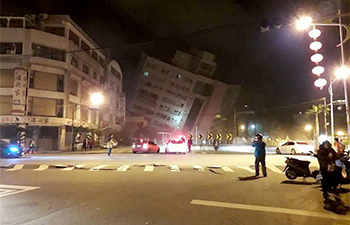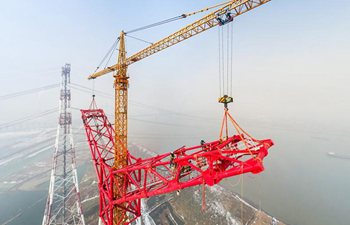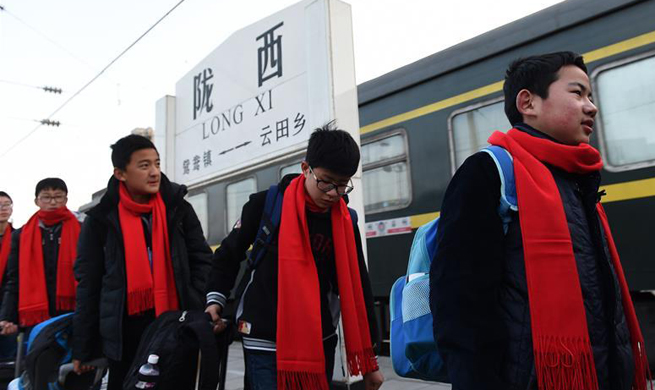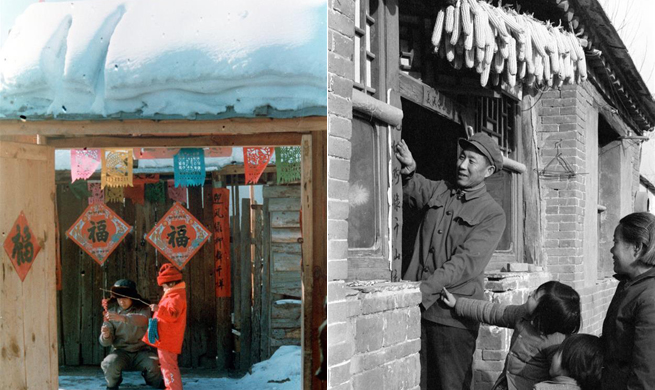BEIJING, Feb. 6 (Xinhua) -- Explosive growth of new energy vehicles in China will pose a great challenge to battery recycling, a downstream industry that has not kept up with the sharp expansion of plug-in autos.
China's new energy vehicle market recorded another year of rapid growth in 2017 as the government continued its strong push for green transport. New energy vehicles refer to vehicles powered by non-traditional fuel, for example, electric and hybrid vehicles.
A total of 777,000 new energy vehicles were sold in the Chinese market last year, up 53.3 percent year on year, according to the China Association of Automobile Manufacturers (CAAM).
The growth was 0.3 percentage points faster than in 2016, when China sold more new energy vehicles than anywhere else for a second year.
New energy vehicle output jumped 53.8 percent to 794,000 units last year, according to CAAM. The stock of new energy vehicles is the world's largest, with 1.53 million by the end of 2017.
According to Shenzhen Gaogong Industry Research Co. Ltd., in 2016, there were about 12,000 tonnes of car batteries that needed recycling, and the figure is expected to jump to 248,000 tonnes by 2020.
"The number of batteries that need to be recycled will climb very fast after 2018," said Bai Min, an assistant researcher at the Center For International Economic and Technological Cooperation.
Lithium batteries, commonly used by new energy vehicles, pose less hazard to the environment compared with lead-acid cells. Copper, cobalt and nickel in the batteries also have high recycling value.
"Lithium is in high demand, and for example can be used for rechargeable laptops and mobile phones. There is money to be made from a used battery," Bai said.
While the new energy cars' environmental benefits are clear, they come with certain challenges.
Zhang Zheming, assistant researcher with Shenzhen Institutes of Advanced Technology, warned that the used batteries pose hazards if mishandled.
"If car batteries are not properly handled they may explode. Acidic substances that are needed to process the batteries are also hazardous to humans and may pollute air and soil," Zhang said.
On the whole, China's battery recycling industry has not developed in tandem with the auto industry, said Zhang Changling, senior engineer of China Automotive Technology And Research Center.
"Many recycling companies are still using old ways, like taking down the parts manually, which have great security and environment risks," Zhang Changling said. "Certified recyclers are still lacking."
"We need to prevent the used batteries to be randomly sent to the scrap-yard or uncertified recycling firms that simply take them apart and re-sell," he said.
Meanwhile, industrial standards regarding transportation of the car batteries are still baffling, Bai Min said.
"If car batteries are transported by regular vehicles, the transportation cost is around 30 percent of the total recycling cost. But if the batteries are considered dangerous waste, and transported by special vehicles with special permits, the costs will be doubled."
"How the government regulates the transportation and storage of used batteries will greatly impact the industry of recycling. So far, the details are not yet hammered out," Bai said.
In 2016, the State Council said electric car makers should be responsible for building a recycling network for used batteries, and use an after-market network to recycle used batteries.
Zhang Zheming said experts are calling for professional firms to deal with car battery recycling. "It will be great waste if each company builds its own recycling system," said Zhang Zheming.
China has intensified efforts by offering tax exemptions and discounts for new energy vehicle purchases, and ordering government organizations to buy more new energy cars.
The government expects new energy vehicle output and sales to hit 2 million annually by 2020, and overall auto output to reach around 30 million by 2020 and 35 million by 2025, according to a government plan.
Experts said the sharp expansion would lead to massive amounts of scrapped batteries and the recycling industry should keep up.
"We should establish a tracing system for the batteries and increase crackdowns on improper recycling behaviors," said Ge Jianping, assistant professor with China University of Geosciences.

















